
|
Muste
Notes |
||||||||||||||||||||
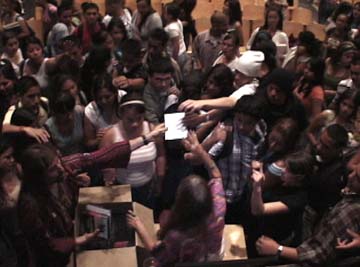 |
At Roosevelt High School in East Los Angeles, students crowd around to get free copies of “Arlington West” after seeing the film and listening to an Iraq veteran and a military parent speak at an assembly. Photo by: Arlington West Film and Speakers Program |
Arlington West Film and Speakers Program received a grant from the Muste Institute last September to organize screenings and discussions using the film “Arlington West” at high schools which are heavily targeted by military recruiters. As part of the presentations, an Iraq war veteran and a family member of a soldier speak to the students. Free DVD copies of the film are handed out after the screening to students who have been considering signing up for the military, or have friends or family members considering military service. At recent presentations in the Los Angeles area, students were also encouraged to join other volunteers in setting up crosses at the Arlington West Memorial for fallen soldiers, on the Santa Monica beach. The program has reached over 1,800 students so far, and more than 400 copies of the film have been distributed to interested students. For information, send an email message to [email protected] or see their website: http://www.arlingtonwestfilm.org
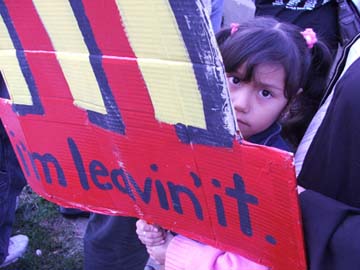 |
A child holds a sign protesting McDonald’s at the October 2006 Midwest Mini-Tour organized by Coalition of Immokalee Workers and Student/Farmworker Alliance. Photo by CIW/SFA. |
Student/Farmworker Alliance has announced a series of upcoming events to support struggles for labor justice. The 8th Annual Student Labor Week of Action will take place March 28 through April 4, 2007, at hundreds of campuses around the country, demanding access to affordable education, respect for campus employees and corporate accountability in addressing sweatshop conditions in the fields. Then on April 7, the Coalition of Immokalee Workers launches its McDonald’s Truth Tour, including a major mobilization on April 13 and 14 in Chicago. Part of the Campaign for Fair Food, the tour will step up pressure on the McDonald’s corporation to end the exploitation and abuse of field workers who pick tomatoes for its fast food restaurants. The Muste Institute gave $2,000 to Student Farmworker Alliance in September 2004 for the “Boot the Bell” campaign, which successfully forced the Taco Bell chain to address the conditions of tomato pickers. Now the students are again teaming up with the Coalition of Immokalee Workers to get McDonald’s to follow suit. “We are tired, as Martin Luther King Jr. said, of ‘relying on the good will and understanding of those who profit by exploiting us,’” the Coalition warns. For details, see www.sfalliance.org
Meeting Face to Face is a documentary about the June 2005 Iraq-U.S. Labor Solidarity Tour, in which six senior Iraqi labor leaders spoke at events in 25 U.S. cities. By highlighting the voices and perspectives of Iraqi labor activists, the film serves as an educational resource for labor, peace, religious and classroom settings, and for anyone concerned about war and occupation. The Muste Institute supported promotion and distribution of the film with a December 2005 grant to the Center for the Study of Working Class Life. To order the DVD, learn more, and find or host screenings, visit the film’s website, MeetingFacetoFace.org
AJ,
Kennedy and King:
The Quebec to Guantanamo Walk in Georgia
November 1963
by Marjorie Swann Edwin
I was deeply involved in planning and carrying out the 1963 Quebec-to-Guantanamo Walk, which started in Quebec City in May of 1963 and was organized by the Committee for Nonviolent Action, then chaired by A.J. Muste. When JFK was killed, in November of that year, I was in Macon, Georgia. The Walk had stalled there because all the walkers were in jail. (Macon city officials didn’t want an inter-racial walk connected with Cuba going down their main street.)
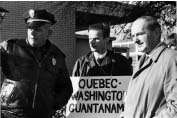 |
Brad Lyttle (center), coordinator of the 1963-64 Quebec- Washington Guantanamo Walk (better known as the Quebec-to-Guantanamo Walk), with David Dellinger and a police officer in Albany, Georgia. Photo: Records of WIN Magazine, Swarthmore College Peace Collection. |
Everyone except Barbara Deming was fasting. There was a lot of support from the Black community; A.J. was staying at the Black church where the walkers had stayed when they first came to town. A.J. asked me to come down and help with press and public relations.
Elaine Weinberg and I went down on the bus. On November 22, I’d been invited to go to the local TV station for an interview, but during the morning I was on a picket line with members of the Black community in front of Macon City Hall.
Suddenly a car came by, stopped, and the driver yelled, “Kennedy’s been shot!” We kept on walking, not knowing if it was a hoax to get us to leave, but a few minutes later another driver yelled “Kennedy’s dead!” We collected our posters and the rest of the group went back to the church, while I went to the TV station. The man who was to interview me filled me in briefly and said, “Of course we can’t do the interview now, but if you want to stay and watch the dispatches coming over the ticker-tape and what’s being reported on TV, you’re most welcome.”
Of course I stayed, and he showed me the ticker tapes as they came off the machine, and we watched the national reporting. The first report naming Lee Harvey Oswald as the assassin said he was the National Chairman of the Fair Play for Cuba Committee (an activist group founded in New York in 1960 to push for normalized U.S. relations with Cuba). Then his position was reduced to the Louisiana Chairman, and finally he was described as just “a member.” After two or three hours, I went back to the church, and told A.J. where I’d been and what the news was reporting. “Something’s fishy, A.J.,” I said. He replied, “I know, Marj, but I don’t know what it is yet.” (There has been much speculation that the Fair Play for Cuba Committee was heavily infiltrated by the FBI and the CIA, and that Oswald was part of that infiltration effort.)
 |
Quebec-to-Guantanamo walkers make their way along a Georgia highway. Photo: Records of WIN Magazine, Swarthmore College Peace Collection. |
The Macon authorities were now in a big hurry to get all the walkers out of jail and out of town. Church people picked them up and brought them to the church, where we all stayed overnight. Months later, I learned that church members with guns stood outside all night, fearful that the church would be burned down with all of us in it.
The next day, several trucks and cars took us with all the gear, posters, etc. back to Atlanta. We went in a roundabout way because no one wanted to drive back the route they had walked—through Griffin, where they had been cattle-prodded and thrown in jail.
We arrived at Mennonite House in Atlanta, run then by Vincent and Rosemarie Harding, a Black Mennonite couple, who welcomed us with open arms. We were given permission to use an old “tenement” across the street from Mennonite House, so we cleaned it up somewhat and a number of us slept there on the floor.
After hearing Lyndon Johnson call for calm and nonviolence, we conceived the idea of having a walk to a downtown park and a vigil supporting the call for nonviolence. Three of us went to the police station and told someone—an assistant chief, I think it was about our plans, and assured him the whole thing would be completely nonviolent in support of the President’s call. We planned to do it on the following Sunday, the weekend after Thanksgiving.
The next morning, as we were cleaning our quarters after breakfast at the “tenement” across the street, several policemen arrived, including the Chief. He grabbed A.J.’s arm and said, “Get across the street, old man. I want to talk to all of you.” The other cops pushed on some of the rest of us, but we stayed calm, and gathered in the living room of the Mennonite House. Without any niceties, the Chief said, “You are not to go to the park and demonstrate—get that?” A.J. said politely, “We aren’t going to cause any trouble; we’re just supporting the President’s call for nonviolence.” The Chief replied: “There will be no demonstration! Period!” and turned around and walked out.
After a few minutes consultation, A.J. called Dr. King and told him what had happened. Martin said, “Just sit tight. I’ll get back to you.” After a while he called back and said to A.J.: “Here’s what we want you to do. My congregation is worshiping with Ralph Abernathy’s congregation at his church on Sunday. We want you to come to church with us, I’ll introduce you and you can introduce the walkers and explain the Walk and your planned demonstration, and we think everything will go okay.”
So the following Sunday we were all in Ralph Abernathy’s church, with our signs and leaflets (we’d made special ones for that day). Martin preached a powerful sermon. Then he introduced A.J., who explained the purpose of the Quebec-to-Guantanamo Walk, and talked about the walk and vigil we planned to do that day. After the service, all the church members lined up on the steps and sidewalk and greeted us and gave us good wishes. Then Ralph and Martin walked one or two blocks with us toward the downtown park and dropped out.
We completed the walk and vigiled for about three hours. We got a lot of thumbs up and warm greetings and almost no nasty responses (I actually don’t remember even one). Of course we were fully prepared to be arrested. To our amazement, we never saw one policeman or even a police car the whole day. Whatever magic Martin and Ralph worked—it worked! A couple of days later, the walkers went back to Macon, resuming the walk near the edge of town and heading on out to the highway.
In January 1964, the march got stuck in Albany, Georgia, where an intense civil rights struggle had been going on for two years. Fourteen marchers and many supporters were jailed, and many of them refused to cooperate. In February, the local police chief finally let the integrated group of marchers walk through town, and the march continued to Miami, facing harassment along the way. From there the walkers planned to go to Cuba, to call attention to the narrow escape from nuclear war in the fall of 1962 during the “Cuban missile crisis,” and to emphasize the necessity for total nuclear disarmament universal if possible, unilateral on the part of the U.S. at least. To that end, CNVA purchased a boat, which Brad Lyttle, coordinator of the Walk, deliberately named “The Spirit of Freedom.” The walkers intended to sail it to Cuba, then walk through Cuba with the same disarmament message carried through the U.S. However, the boat was seized by the Coast Guard and the walkers were all arrested, this time by the federal government. The resulting court case was titled “U.S.A. v. the Spirit of Freedom.” The walkers did not receive sentences or pay fines, but they did not get the boat back, and the Walk was over.
New Grants, December 2006 - February 2007
CENTRE
FOR ACTIVE NONVIOLENT EDUCATION
Dharamshala, India: $2,000
The Center
works to build awareness of active nonviolence in the Tibetan diaspora,
in order to explore nonviolent strategies for building democracy
and human rights. This grant goes for workshops to educate people
living in Tibetan refugee settlements in India about nonviolence
and strategic nonviolent methods.
JK EDUCATION COUNCIL
Orissa State, India: $2,000
JK Education Council is a grassroots women’s
organization formed in 1980 to carry out work for human rights and
against discrimination in rural areas of India’s Orissa state.
This grant goes for an education program training rural women of
Bhadrak, Balasore and Jajpur districts as promoters of active nonviolence
for peace, social justice and equality.
MOVIMIENTO POR JUSTICIA
DEL BARRIO
New York, NY: $2,000
The Movement for Justice in El Barrio
was founded in 2004 in East Harlem, New York City, by residents organizing
around housing rights, immigration and other issues that affect them.
This grant goes to expand the group’s leadership development
and political education program, broadening the skills of new and
experienced leaders to carry on struggles for social justice in the
community.
OKLAHOMA COMMITTEE
FOR CONSCIENTIOUS OBJECTORS
Oklahoma City, OK: $1,850
OCCO was formed
in May 2004 to support conscientious objectors and to provide information
countering military recruitment. This grant goes for a regional workshop
to train volunteers as counselors to inform active-duty soldiers of
their rights and provide information and assistance to those who wish
to leave the military. http://okobjector.org/
OUT OF THE
BLUE PRODUCTIONS, INC.
Brooklyn, NY: $2,000
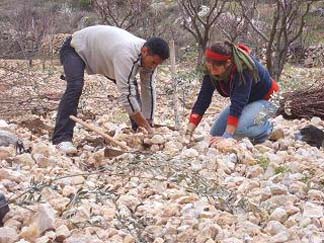 |
Palestine
Solidarity Project helps replant olive |
This grant goes for editing and outreach expenses of The Good Soldier, a feature-length documentary by Lexy Lovell and Michael Uys exploring the journey of five US veterans from different wars as they sign up, go into battle, and change their minds about war. The film is currently in post-production, and is expected out in the Fall of 2007.
PALESTINE
SOLIDARITY PROJECT
Jackson Heights, NY/Palestine: $2,000
This Palestinian-led
nonviolence project was founded in the village of Beit Ommar in the
Southern West Bank during the summer of 2006. PSP is dedicated to
opposing the Israeli occupation of Palestinian land through nonviolent
direct action, and supporting solidarity with Palestinian communities
resisting the Israeli occupation. http://palestinesolidarityproject.org/
| The A.J. Muste Memorial Institute makes small grants to groups engaged in nonviolent education and action for social justice. Our next deadlines to our regular grant program and to our Counter Recruitment grant program is April 13, 2007 Guidelines are at http://ajmuste.org/guidelin.htm |
The NOVA Fund at the Muste Institute, which has supported active nonviolence in Latin America since 1999, has launched a special grantmaking program in 2007 to help grassroots groups in Latin America send member-activists to regional gatherings where they can share organizing strategies, build networks and plan regional campaigns. The NOVA Travel Fund was born from a desire to encourage more grassroots participation at such gatherings, to ensure they are not dominated by paid staff members from well funded institutions. The new program was made possible by a generous $50,000 contribution from the anonymous donor whose ongoing gifts sustain the NOVA Fund. Grants of up to $1,500 will be provided to pay travel expenses of activists to get to regional gatherings. A committee of six seasoned activists from the region will review proposals and make grant decisions six times a year (deadlines are set for the first day of February, April, June, August, October and December). Applications can be received in Spanish, Portuguese, French or English. More details and an application form in Spanish are available on the Muste Institute website at www.ajmuste.org/novaintro.html
* * *
NOVA Fund Grants 2006
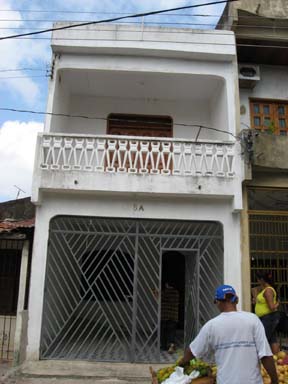 |
“Finally, thanks to the great help of the A.J. Muste Institute and the forest spirits, the Conselho Nacional dos Seringueiros has found a new home in Belém,” Julia from the CNS, National Council of Rubbertappers, wrote us from Brazil in February. “We moved in December and since then the house (pictured here) has already served as a haven for a delegation from Oeiras, in Pará state, which came to Belém to alert the Public Ministry of the deforestation happening in their reserve. They were so happy to have a place to stay, relax and discuss the next steps!!” The previous offices of the CNS were located inside a park that closed at night, so leaders from communities in the far reaches of the Amazon were forced to stay at hotels and eat out every time they traveled to the port city of Belém. The new building includes offices with internet and phone access, a place where visiting member-activists can hang their hammocks to sleep overnight, and a kitchen where they can cook their own food. Photo by CNS. |
Asociación
Civil Centro Esperanza:
$5,000 to develop social leadership skills
among young people in the La Victoria district of Chiclayo, in Peru’s
northwestern Lambayeque region.
Conselho
Nacional dos Seringueiros (CNS):
$7,500 to help Brazil’s National Council
of Rubbertappers buy and renovate a house in the city of Belém
to serve as a regional office, communications hub and lodging for visiting
community leaders. http://www.cnsnet.org.br/
Grupo
Pro-SERPAJ Colombia:
$5,000 for efforts in the Colombian cities of Manizales and
Barranquilla to promote nonviolence and a culture of peace and justice.
Hogar
Comunitario Yach’il Antzetic:
$3,000 for activities promoting the health,
well-being, rights awareness and self-esteem of single pregnant women
and single mothers and their children in the southern Mexican state
of Chiapas. Organización Nacional Indígena de Colombia
(ONIC): $5,000 for the International Verification Mission on the Situation
of the Indigenous Peoples of Colombia, held in September 2006. http://www.onic.org.co/
Organización
Wayúu Munsurat:
$5,000 for an April 2006 meeting of the Wayúu
indigenous people in Bahía Portete, in the northeastern Colombian
department of La Guajira, to build strategies of civil resistance against
poverty and extermination.
Red
Juvenil:
$5,000
for efforts to educate and mobilize for the rights of conscientious
objectors in Colombia, and to promote the use of active nonviolence
in social struggles. http://redjuvenil.org/
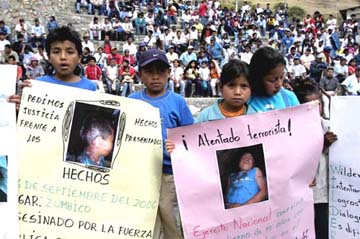 |
Indigenous children in Jambaló, in the southern Colombian region of Cauca, take advantage of the visit of an international verification mission to draw attention to recent killings. The NOVA Fund made a grant to the National Indigenous Organization of Colombia (ONIC) for the September 2006 mission, which visited five regions and attended national gatherings in Bogotá to learn—and spread awareness internationally—about the repression faced by Colombia’s indigenous communities as they nonviolently defend their rights and land. Photo by ONIC |
SER
PAZ:
$10,000
for work with high-school students and at-risk youth in Guayaquil,
Ecuador, providing peer conflict resolution and education toward a
culture of peace. http://www.serpaz.org/
SERPAJ-América
Latina:
$13,500 for coordination and support of educational work promoting
active nonviolence and social justice in Latin America. http://www.serpajamericalatina.org
SERPAJ-Costa
Rica:
$5,000 to build a culture of peace and promote the defense of people’s
human, civic, social, economic and cultural rights in Costa Rica.
SERPAJ-Paraguay:
$10,000 to build awareness of and expand opposition to military intervention,
militarization, repression, and violations of human, social, economic
and cultural rights in Paraguay; and to promote nonviolent action and
education for peace and justice.
SERPAJ-Uruguay:
$5,000
to promote respect for diversity and help youth organize for their
rights in the residential area of Malvín Norte in Montevideo,
Uruguay. http://www.serpaj.org.uy/
* * *
Counter Recruitment Fund Grants, December 2006
The Muste Institute’s Counter Recruitment Fund makes small grants for grassroots efforts to inform young people about the realities of military service, help them find other education and employment options, and provide alternative points of view to those presented by military recruiters. Our next deadline for proposals is April 13, 2007. Guidelines are at ajmuste.org/counter-recruit.htm.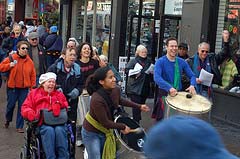 |
Brooklyn Parents for Peace are joined by the Samba School for Social Justice in a Counter-Recruitment leafleting action near Brooklyn's Fulton Mall on March 10. Photo by Rob Hoey |
Art
for Change (New
York, NY):
$500 for local youth to develop and distribute original counter-recruitment
posters and artwork. http://artforchange.org/
Brooklyn
Parents for Peace (New York, NY):
$500 for a campaign to educate parents and students about “opt-out” rights. http://brooklynpeace.org/
DRUM-Desis
Rising Up and Moving (New York, NY):
$500 for counter-recruitment work in Queens high schools with large South
Asian immigrant populations. http://www.drumnation.org/
Long
Island Counter Military Recruiting Committee (Huntington, NY):
$500 for the “Alternatives to the Military” career fair.
Oklahoma
Committee for Conscientious Objectors (Oklahoma City, OK):
$500 for counter-recruitment work in local JROTC high schools. http://okobjector.org/
OPTIONS (Silver Spring,
MD):
$500 for the Montgomery County “Do You Know Enough to Enlist?” Awareness
Campaign.
Raleigh
Counter-Recruitment Coalition (Raleigh, NC):
$1,000 for counter-recruitment work in Wake County public schools.
Renton
Youth against War and Racism (Renton, WA):
$500 for ongoing counter-recruitment efforts at Renton High School. http://www.myspace.com/31607241
Washington
Area Truth in Recruiting (Bellevue,WA):
$1,000 for “Influencing the Influencers” campaign at statewide
meetings of guidance counselors and PTAs. http://www.watir.org/